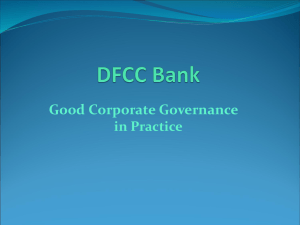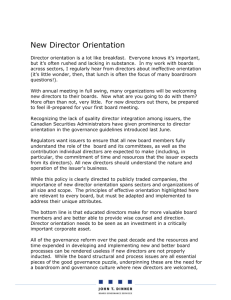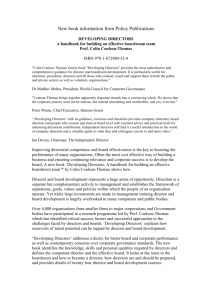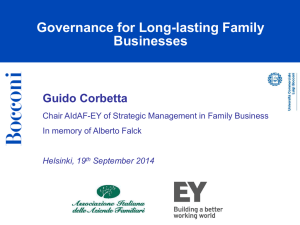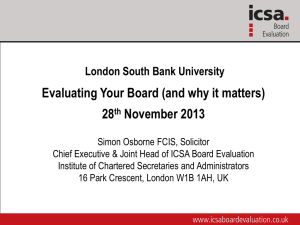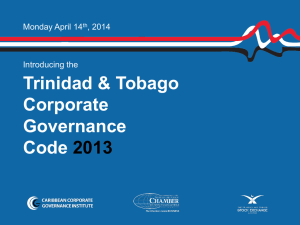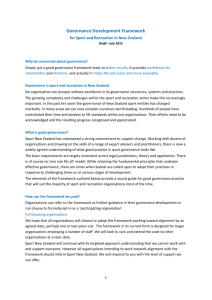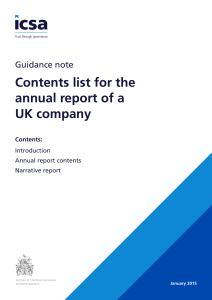HIGH PERFORMING BOARD - Sport and Recreation Alliance
advertisement
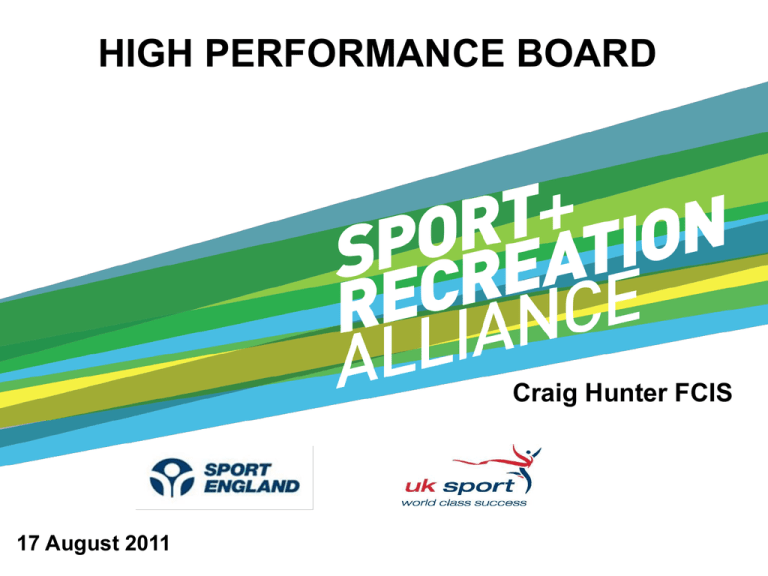
HIGH PERFORMANCE BOARD Craig Hunter FCIS 17 August 2011 Craig Hunter FCIS - my career • Chartered Secretary in Public Practice – 30 years experience, with award winning business • FTSE and global companies, charities, private groups, sporting organisations, sole traders • British Swimming independent director • European Swimming technical committee member • International swimming referee • British Swimming team manager 1989-2006 • Olympic Games 2000, 2004, 2008 • Commonwealth Games 1998, 2002, 2006, 2010 • UK Sport Mission Control panel member Programme • Governance structure & board composition • Directors’ duties and responsibilities • Effective performance • Purpose of the board • Independent directors • Competencies • Behaviour • Governance oversight • Board evaluation Typical corporate structure Shareholders Annual General Meeting Board of Directors Exec Audit Executive Non-exec Remuneration Clients Nomination Typical sport structure? Council Annual Meeting Board of Directors Exec Audit HC Reps Executive Independents Remuneration Membership Nomination Legal status • Incorporated body • Company limited by shares of guarantee • Articles of association • Companies Act 2006 • Charity • Trust deed • Charities Act 2006 • Unincorporated body • Rules Round table discussion • Briefly outline your board composition and structure as well as the challenges you face The perfect model - 1 • Independent chair • • Internal or external appointment? Dynamic CEO • Supported by executive management team • finance, legal, marketing, performance/participation • Appropriate non-executive/independent directors • • Skills based –v- regional/Home Country representatives Appointed –v- elected The perfect model - 2 • • Board composition and size • Diversity • Candidates able and willing to challenge convention • Balance of executive and independent/non-executive • Broad range of experience Appointment • Process, rolling –v- fixed term, terms • Duties • Delegations of authority • Terms of reference • Effective performance • Board evaluation • Succession planning Directors’ duties and responsibilities • Companies Act 2006 • Duty to • act within powers • promote the success of the company • exercise independent judgement • exercise reasonable skill, care and diligence • avoid conflicts of interest • not accept benefits from third parties • declare interest in proposed transaction • declare interests in existing transactions Dept. Business Innovation & Skills Simple high-level guidance for directors: • Act in the company’s best interests, taking everything you think relevant into account • Obey the company’s constitution and decisions taken under it • Be honest, and remember that the company’s property belongs to it and not to you or its shareholders • Be diligent, careful and well informed about the company’s affairs. If you have any special skills or experience, use them • Make sure the company keeps records of its decisions • Remember that you remain responsible for the work you give to others • Avoid situations where your interests conflict with those of the company. When in doubt disclose potential conflicts quickly • Seek external advice where necessary, particularly if the company is in financial difficulty Effective performance • Effective directors • Effective decision-making • Effective board performance • Board evaluation Round table discussion • Describe your role within your organisation/sport • What attributes/skills do you have? • What constrains you/your board/your organisation? The purpose of the board • Key decision-making body responsible for leadership, integrity, performance, and risk profile of company • Board should determine the purpose of its meetings • Reassert the distinction between governance, strategy and operational matters • Emphasise the importance of the board proactively crafting policies, processes and systems to ensure the delivery of its strategic objectives • Ethical sensitivity? • Consider how the board, collectively and in terms of individual contributions, might improve the overall effectiveness of their responsibilities in areas such as decision-making, strategy development and financial analysis Skill levels in the boardroom • Importance of induction • Development and training • Need for on-going support and development • Access to operations and staff • External advice • Benchmarking directors’ performance – evaluation Competencies • A breadth of experience • Team player who leaves their ego at the door • Independent adviser, able to challenge as well as support • Committed and prepared • Articulate communicator and good listener • Sharp mind and good judgement • Visionary, creative, and passionate • Build strong relationships and act as ambassadors • Self-confident without being dogmatic • Enhance their contribution through feedback Source: Whitehead Mann Weaknesses • Being a passenger or nodding dog • Critical but not supportive – not adding value • Still acting as a Chief Executive or frustrated Executive/Director • Sloppy thinking or not up to the job • Self centred • Demanding too much detail and overloading • Unprepared • More on “broadcast” than “receive” • Lacking courage to disagree • Divisive and dogmatic Source: Whitehead Mann The independent director YES, I am independent YES, I understand the business YES, I challenge our executives YES, I keep up to date with current developments YES, I attend board meetings The Boardroom Framework Roles Objectives Responsibilities Purpose Drives Outstanding Performance Promotes Strong Management Facilitates Quality Working Practices Skills and Skills development People Board Composition/ Structure Relationship Management Communication/ Reporting Process Board Meetings Business Knowledge Policies and Procedures Ongoing Development Guidelines, Regulations, and Commercial/Sporting Requirements Boardroom behaviour ICSA report concluded: “Best practice boardroom behaviour may be characterised by • A clear understanding of the role of the board … • Independent thinking • Challenge which is constructive, confident, principled and proportionate • Rigorous debate … and • Supportive decision-making environment” Appropriate boardroom behaviours • Develop a culture of constructive and robust challenge in the boardroom • Avoidance of “groupthink” culture • Interrelationships within the boardroom • Group dynamics, as well as the contribution of (key) individuals • Interaction with employees • Social context (dinners, away-days, events) • Ground rules for meetings Board agenda and meetings • Standard agenda items and annual plan • Allocate sufficient time • Presentations by key executives • Role of board papers • Robust discussion & challenge • Behaviour • Corporate message - unanimity • Accountability • Use and role of committees • Focus on strategy, financial management, governance, performance/participation, risk Governance oversight There are three levels • Institutional – are the corporate governance policies and architecture fit for purpose? • Organisational – has management installed adequate processes and systems? • Behavioural – are directors exhibiting the appropriate behaviour? • Sport & Recreation Alliance • Voluntary Code of Good Governance for the Sport and Recreation Sector Board evaluation - 1 The Walker Review: “The board should undertake a formal and rigorous evaluation of its performance, and that of committees of the board, with external facilitation of the process every second or third year…” Board evaluation - 2 • Who is involved? • Chairman • Directors (executive & independent) • Staff • Independent observer? • Process: robust assessment of strategic plan and outcomes • Frequency and facilitation • Potential conflicts of interest • Nature and importance of board evaluation • How outputs of the process can be meaningfully disclosed without compromising confidentiality • Notification to stakeholders Resources • www.icsa.org.uk • Corporate, voluntary & community sector • Committee terms of reference • Audit, Executive, Nomination, Remuneration, Risk • Guidance • Joining the right board: due diligence for prospective directors • Induction of new directors • Directors’ duties • Job/role descriptions • Financial Reporting Council • The UK Corporate Governance Code (June 2010) • Guidance on Board Effectiveness (March 2011) Sport Management Consultancy www.versec.co.uk M: 07771 814929 T : 01727 855512 F : 01727 855501 E : craig.hunter@versec.co.uk Registered in England at 39 Alma Road St Albans AL1 3AT Company Number: 3999397 VAT Number:706 0811 65



